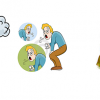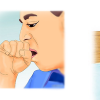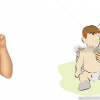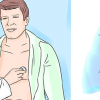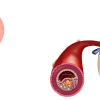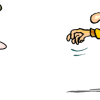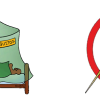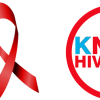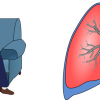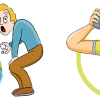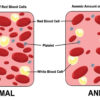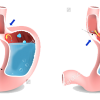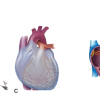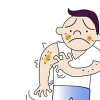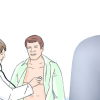Tag: cardiology , cardiovascular , cough , fatigue , leg swelling , shortness of breath , weakness
-
Lung Cancer
Lung cancer (Bronchogenic carcinoma) is the most common type of cancer worldwide and a leading cause of cancer death for both men and women. Lung cancer occurs when the normal cells of lungs abnormally change their characteristics and grow uncontrollably. Lung cancers may be
-
Shortness of breath (Dyspnea)
Shortness of breath or dyspnea is an abnormal awareness of own breathing. It is described differently by different people. Some describe it as not getting enough air or feeling suffocated while others describe it as a sensation of chest tightness or inability to breath out completely. Dy
-
Chest Pain or Tightness
Chest pain is the pain that may be felt anywhere from the level of shoulder to the bottom of ribs. Chest pain or tightness is sometimes a serious symptom, resulting from heart attack. But having chest pain does not necessarily mean you are having a heart attack. Most people who go to the emergency room with chest pain
-
Palpitation
Palpitation is a condition where you become abnormally aware of your own heartbeat. You may feel a sensation of skipped heartbeat, rapid and irregular heartbeat, a forceful thumping or fluttering sensation in your chest. Palpitation,
-
Cough
Cough is our body’s protective response to the presence of irritants in the airway. It is a reflex action caused by the stimulation of the nerve endings in the respiratory tract by stimuli such as allergen, microbes, foreign body or excessive mucous. After the stimuli reaches the bra
-
Pneumonia
Pneumonia is an infection of the lungs caused by a variety of germs. These germs reach the air sacs (lowest part of airways) after inhalation, overcoming body's normal defense mechanism like nasal hairs, mucus and cough which are weakened by smoking or dust inhalation. Once in the lungs,
-
Tuberculosis
Tuberculosis (TB) is a communicable disease caused by Mycobacterium tuberculosis. It can affect any organ in the body but lungs (Pulmonary TB) are the most common site of infection. Other common sites of infection are bones, lymph nodes, kidneys, uterus, brain (meninges), skin, etc. Tuberculosis i
-
Acute Kidney Failure
Kidney failure means the kidneys become unable to filter the blood and remove waste and excess salt and water from body. Kidney failure can occur acutely over hours and days or develop gradually over a period. When kidney stops working abruptly, it is called acute kidney failure (injury) . When kidney function
-
Fatigue / Tiredness
Tiredness means you feel exhausted both during activity as well as rest,, even while sleeping as well. It is not a disease but could be a symptom of various physical and psychological ailments. It can alternatively be called as fatigue; exhaustion; lethargy or weariness. We all
-
Vitamin Deficiency
Vitamins are a group of substances that are needed, in very small amounts, for your body to grow and develop normally. There are two broad categories of Vitamins based upon how they are absorbed:
- Fat-soluble vitamins
-
Systemic Lupus Erythematosus (Lupus)
Systemic lupus erythematosus (SLE) is a disease of immune system that can affect many organs in the body. Normally, the immune system produces proteins directed against infectious agents and protects us from infection. In SLE, however, your body produces antibodies that attack body’s o
-
Malaria
Malaria is a febrile, mosquito-borne disease caused by parasitic protozoa, Plasmodium. Four different species of Plasmodium cause malaria. The parasite is transmitted by bite of female Anopheles mosquito. It occurs mostly in high temperature areas - tropical regions and the Terai belt of Nepal. Infected female Anoph
-
HIV/AIDS
Introduction HIV (Human Immunodeficiency Virus) is the virus that causes AIDS (Acquired Immunodeficiency Syndrome). Infection by HIV weakens your immune system. When the immune system becomes too weak to fight, organisms that would otherwise not cause an infection in a normal person, that person is
-
Heart Failure
Heart failure means your heart is not able to pump out sufficient amount of blood into the rest of the body. It does not mean that your heart has stopped to beat which is called “cardiac arrest” (see Heart Attack for more informat
-
Heart Attack
Heart attack is a leading cause of death in adults. The medical term for heart attack is myocardial infarction. Heart attack occurs when the blood flow to the heart is severely reduced or completely blocked. The heart muscle needs regular supply of blood and oxygen to survive.
-
Chronic Obstructive Pulmonary Disease (COPD)
COPD is a chronic condition of the lungs that causes difficulty in breathing. It is caused by long standing exposure to irritant gas or particles most commonly by cigarette smoking. In developing countries indoor smoke exposure from firewood burning also is an important risk factor.
-
Asthma
Asthma is a chronic respiratory disease that affects your airways (windpipe). The windpipe is inflamed, narrowed and swollen that causes difficulty in breathing now and then. A person with asthma has no difficulty in breathing most of the time except during an asthma attack. As
-
Anemia
Anemia Anemia is a condition where your hemoglobin level is low. Hemoglobin is the substance found in the red blood cell that carries oxygen in the blood. When you are anemic the oxygen carrying capacity of you blood in reduced and it may not be enough to meet the dem
-
Gasteroesophageal Reflux Disease
Gasteroesophageal reflux disease (GERD) is also known as acid reflux. GERD occurs is when stomach contents leak backwards (called “reflux”) into esophagus and cause symptoms or complications. Reflux is a normal process in infant, child or adult, but when it causes troublesome s
-
Diphtheria
Diphtheria is an infectious disease caused by bacteria Corynebacterium diphtheriae. The infection affects the respiratory passage leading to sore throat and breathing difficulties. The disease produces a
-
Atrial Fibrillation (AF)
Atrial Fibrillation (AF) is a disorder of heart rhythm that manifests as an irregular heartbeat. Usually, it is associated with rapid heart rate ranging from 100 to 170 beats per minute. But you can have atrial fibrillation with normal heart rate specially if you are treated with med
-
Allergy
Allergy is a conditions where your body abnormally reacts to foreign substances that normally should not produce any reaction. These substances are called allergens. Your immune system, which is responsible for protection of the body against external agents, recognizes these allergens as “invaders” and produce prot
-
Acid Reflux Disease
When we eat food, it travels through the mouth to the food pipe (esophagus) and then to the stomach. Once in the stomach, food cannot come back up into the esophagus under normal conditions because of the presence of the lower esophageal sphincter (LES). LES is a group of fiber muscle rings at the lower end of the food



